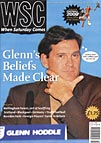 Padraig McKenna charts the moves in the botched takeover and flotation of Forest which have left the club in such a parlous state.
Padraig McKenna charts the moves in the botched takeover and flotation of Forest which have left the club in such a parlous state.
In autumn 1996 Nottingham Forest were approaching a crisis. Brian Clough was gone and we had already, briefly, dropped down into the First Division. The club was surviving largely due to the willingness of the banks to increase the overdraft regularly.
Uniquely, ownership of the club at the time was entrusted to 209 shareholders who were nominated when vacancies arose, and paid £1 for this privilege. It had only been 12 years since Nottingham Forest had become a limited company, a move prompted by the realisation that those shareholders would be liable in the event of insolvency.
With the overdraft standing at £15 million, an advertisement appeared in the Financial Times, offering “A unique opportunity for investors to assist the club in implementing its plans for the next millennium”. Two rival groups appeared to be interested in bidding. In order that the constitution of the club be changed to allow a takeover, 75 per cent of the shareholders needed to be persuaded to vote in favour.
One of the consortia was headed by Sandy Anderson, a season ticket holder and the fans’ choice. But when his group also appeared to be the likely choice of the shareholders, the 75 per cent requirement was used by the other bidder to block a quick resolution of the matter.
Anderson’s rival was a group fronted by Phil Soar, Irving Scholar and Nigel Wray, which later became known as Bridgford plc. One of its members, quoted in Phil Soar’s Official History of Nottingham Forest, said: “We realised that 150 votes weren’t really vital. If we had more than 50, we could always prevent anyone else winning and gradually wear the opposition down.”
As a result of these questionable tactics, the takeover battle became drawn out over the winter. Eventually the shareholders had only the Bridgford consortium’s offer to consider. On February 24th 1997, having been told the bank were intending to appoint an administrator the following day, the shareholders voted 189 to 13 to accept the single remaining offer.
During the negotiations with the shareholders, the personnel of the consortium had changed several times, and the source of the money they promised to bring to the club was, by their own admission, not known at times during the bidding. Prolonging the takeover had prevented any attempts to strengthen the team and when some money was made available it was too late to save the club from relegation.
Despite dropping out of the Premier League, prices for season and match day tickets increased by approximately 30 per cent for the 1997-98 season. When season tickets went on sale, 6,000 of the 18,500 who had bought the previous year chose not to renew. Against the judgement of their financial advisors, the board then pressed ahead with a flotation which, rather than raising the foreseen £20 million, is believed to have brought in only around £1.8 million. In retrospect, it seems clear that the botched flotation caused some of the leading figures on the board to become disenchanted with their flirtation with football. Since then, their commitment to the long term future of Forest has been very much in doubt.
At the recent game with Arsenal, 5,000 leaflets were distributed detailing a motion of no confidence in the board of Nottingham Forest plc. Several protest meetings have been held and more action is being planned.
According to Larry Lloyd, who now straddles a precarious fence as both a local radio commentator and an employee of the club, a senior player explains the demoralised performances of the team by saying that 70-80 per cent of the squad are in some sort of dispute with the club. The number of fans in dispute with the board is certainly in excess of that figure.
From WSC 145 March 1999. What was happening this month